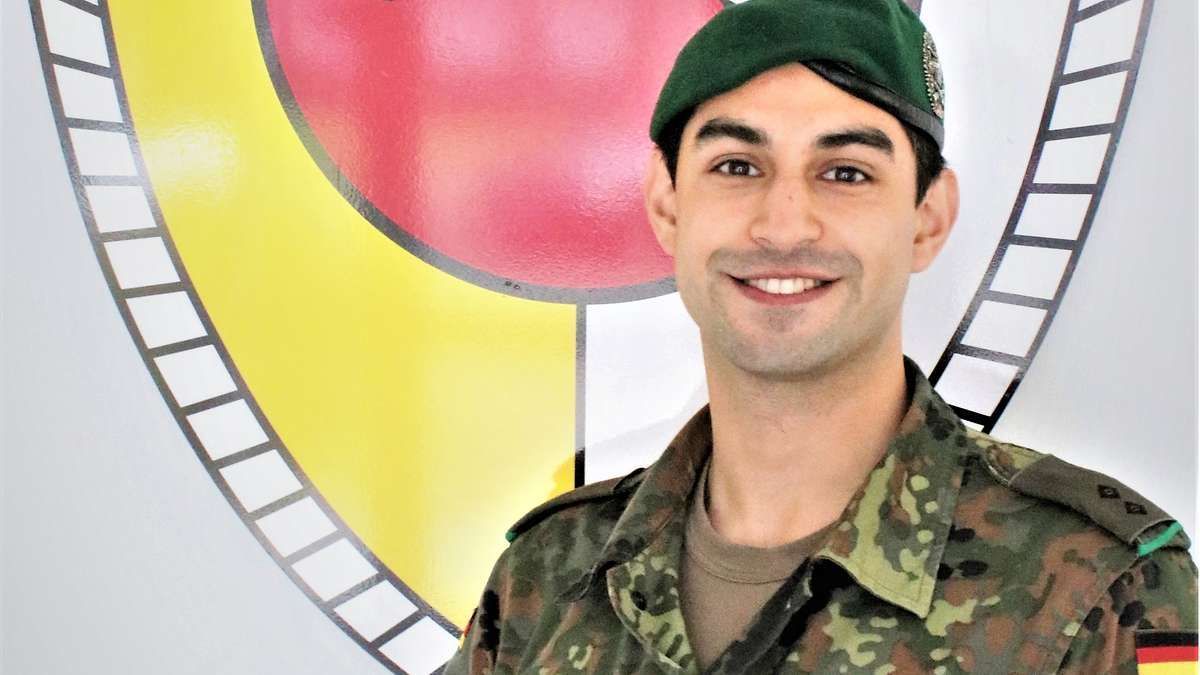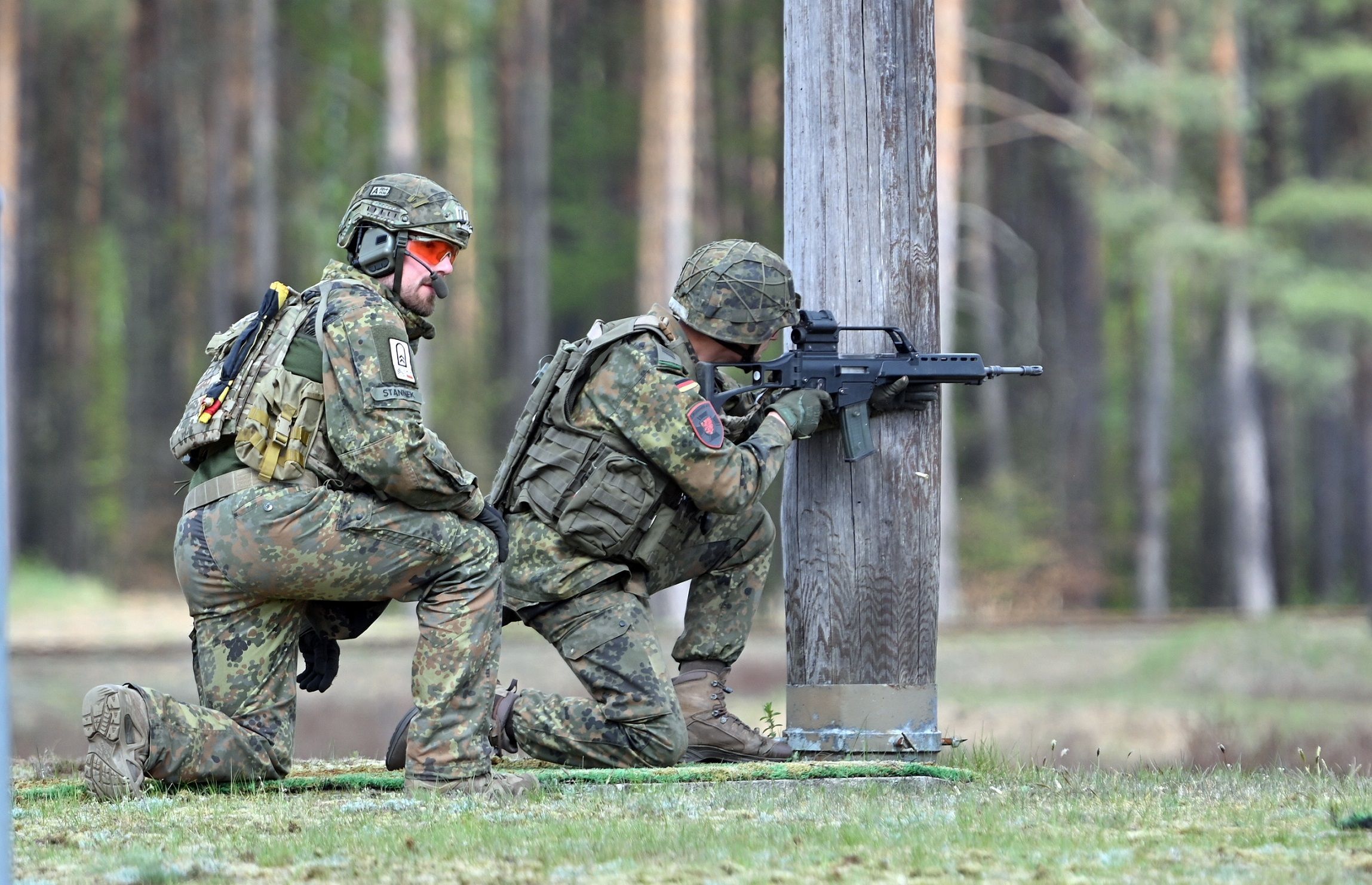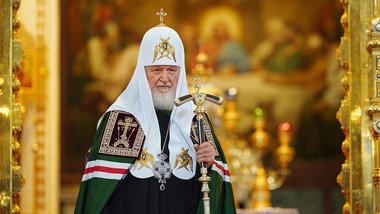“God is not a pacifist”

Jonathan Steinert, PRO
PRO: You are a reserve officer. What did you think when you heard about Russia's attack on Ukraine?
Fabian Neumann: "My first impulse was: I have to do something. That is why I asked the Bundeswehr whether they needed more personnel because of the Ukraine war. But that was not the case. If a third world war were to break out, I want to be part of it so we can return to a peaceful state and our life. I consider it very blessed that we as Christians can live our faith freely and are doing well economically and much more."

You made a conscious decision to commit yourself to a place where, in case of doubt, you could pay with your life and also might have to take someone else's life. Why do you accept this risk?
"When I joined the Bundeswehr, the question did not concern me as much. It was just clear to me that this would be part of the job. I am critical of the fact that the Bundeswehr is being portrayed as an increasingly civilian employer. But the profession of a soldier is not like any other job. It was clear to me that when in doubt, weapon training serves to protect my comrades or me by shooting at anyone who shoots at us. When I came to the Christian faith at 25, I asked myself whether this would involve a new ethical dimension for me."
What conclusion did you come to?
"I have found that God has nothing against soldiers. Many soldiers or captains in the Bible are portrayed positively. The Bible even describes the Roman centurion Cornelius as a model of faith. Soldiers, among various other professions, asked John the Baptist what they should do. And he did not tell them to quit their job. He only said: "Do not mistreat anyone. Do not make false accusations, and be content with your wages."
How about killing?
"Strictly speaking, the fifth commandment says: "Thou shalt not murder", in other words, kill without law. If I look at the Old Testament, I would say God is not a pacifist. On the contrary, He has repeatedly used soldiers as tools in His hand. That was also a signal for me: as long as it happens according to their certain rules, killing is compatible with the Christian faith."

Which rules are there?
"Because of the Second World War, the craft of war in Germany is relatively regulated. For example, as a soldier, if I know that orders from my superior violate international law or are otherwise illegal, I can refuse them. I could be prosecuted at the International Criminal Court in The Hague if I carried out orders to mistreat or kill prisoners of war. Therefore, the soldier is responsible for his own actions. In addition, we are a parliamentary army. The German Bundestag decides with a mandate on where the military goes. The Basic Law also forbids preparing for a war or aggressive actions.
Nevertheless, wiping out a human life crosses an inner inhibition threshold, which one can also say that God put in us.
"That is correct. As part of our training, we had something that is called drill training. A combat situation is re-enacted, including complete equipment with helmet, rifle, backpack and the like, to condition the soldiers not to think in a critical situation but to act.
The moment it really comes to a confrontation, you do not think primarily of defending the Basic Law or the military tradition of the Napoleonic wars of liberation. You just see: The guy in front of me also holds a gun. That is why I can well imagine that, in this specific situation, there will not be many dilemmas of conscience. It is part of the professional soldier's trade to put civilisation inhibitions aside when in doubt."
But you accepted the risk of ending up in such a situation when you decided to join the Bundeswehr. Why did you do so? You could also serve our country in a civilian job."
"There are certain rights and values you must be prepared to defend with weapons if necessary. An example of these would be human rights. And it may also be required to settle a conflict situation militarily as part of a peacekeeping mission.
A good example is Kosovo, where, among other things, the German armed forces contributed to the KFOR mission so that different groups no longer fought each other. This relative peace had to be enforced military by international troops. If I know the mission is to prevent a worse evil, I can represent that.
Due to my Christian faith, I am convinced: There will be no peace in the world before Jesus Christ returns. But until then, we should live together as peacefully as possible if possible.
As a soldier, I can contribute to that. Incidentally, it also ensures that aid organisations or missionary organisations can become active. Civil aid needs stable state structures that have a monopoly on the use of force, security forces, such as soldiers or the police."
"Pacifism is unbiblical"
A retired German pastor, Bernhard Ritter, argues that pacifist thinking is unbiblical. Neither in Jewish thinking nor early Christianity, there are "thoughts of pacifism", Ritter writes, as reported by Idea.
According to the retired pastor, many Christians long for the end of all wars. He thinks that they should "deploy all their strength for peace." However, Ritter believes that this peace will not become a reality until the establishment of the kingdom of God.
Furthermore, he argues that anyone who wants to live in peace and freedom "must ensure that this freedom can also be protected." Anyone, who is a pacifist, ultimately supports the enemies of peace, Ritter believes.
(CNE.news)
You have two children, aged two months and two years. How do you deal with the thought that you might die in war and leave your wife and children behind at home?
"I know my life here is temporary. Death does not scare me because I know that we Christians have a perspective that goes beyond it. I believe that God will take care of me – and certainly of my family as well.
Of course, in an emergency, the thought of what happens to my wife will weigh on me and challenge me. On the other hand, we would only be sent on a mission in case of defence. And I know that defending Germany is also defending democracy, the rule of law and how we live. I do the same for my children."
When you hear about a war of aggression like in Ukraine, and you know that our country could also become a target, and you could be called to war, does that thought scare you?
"No."
Why not?
"We have a great God Who holds the whole world in His hands. And when our individual hairs are numbered, as Jesus once said, then nothing will happen that He does not allow. So I am relatively relaxed because I know where I am going and Who is watching over me. Maybe that relaxation also has something to do with the fact that I studied military science and scientifically dealt with the phenomenon of war.
Because of that and my experience in the Bundeswehr, I may have developed a sober view of it. For example, it is easier for me to understand what is happening in Ukraine. People are often afraid of things they do not know, of which they do not know what it actually means. But I do not want to rule out the possibility that I will be emotionally affected if I have to go on an assignment and my children are screaming and clinging to my leg and saying: "Dad, stay here!"
Some people are demanding to make peace without weapons. Or they criticise the arms supply to Ukraine. Do you think they are naïve?"
"It will always be necessary to have people with certain skills to gain the upper hand in a martial context, and that these skills must be accompanied by certain material. I understand the idealistic approach, but it only works if there is not someone who is of bad will and willing to use military force. Putin will not be stopped by the peace demonstration in Leipzig, but only by tanks on the Ukrainian border."
"Disturbing that Christians are not allowed to reflect on pacifism"
While pacifism was common in Pentecostal circles, this has changed today. That is what pastor Pascal Andréasson notices. He says in Dagen that it is disturbing that the debate and reflection on pacifism have vanished. "We have no books on peace and no conferences or discussion days where peace is discussed."
Andréasson calls for more conversation about the topic. "I understand that the Free Church and the Pentecostal movement have processed these issues to a very small degree in recent decades and are therefore unprepared and ignorant of the historical legacy and the great reflections that have been made." (CNE.news)
Do you share your faith with your comrades?
"It is essential to me to be active as a missionary within the Bundeswehr. Many Christians take offence to the army. That is a pity because it is an underestimated and unprocessed mission field. Soldiers have to deal with life and death in their job. Anyone who goes abroad must first make their will. I find it criminal, at least in my opinion, that the military chaplaincy does not promote the Bible and the message that there is a perspective beyond death."
How can you testify of your faith in the army?
"My comrades know I am a Christian and work for a Christian company. Last year, we had a Christmas party with our comrades. I gave them a little devotional book and said: "Anyone who wants to know why we celebrate Advent and what the Christmas story is about can read this." I know God wants to use me there."
This article was translated by CNE.news and published by PRO on September 5, 2022








